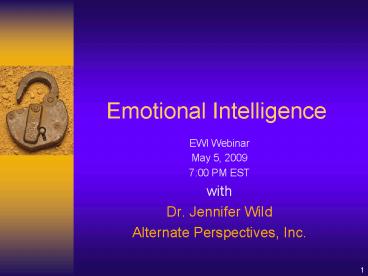Emotional Intelligence - PowerPoint PPT Presentation
1 / 25
Title:
Emotional Intelligence
Description:
About the five areas of Emotional Intelligence ... The ability to understand others and to ... Motivating oneself: delaying gratification and stifling impulses ... – PowerPoint PPT presentation
Number of Views:72780
Avg rating:4.6/5.0
Title: Emotional Intelligence
1
Emotional Intelligence
- EWI Webinar
- May 5, 2009
- 700 PM EST
- with
- Dr. Jennifer Wild
- Alternate Perspectives, Inc.
2
You will learn
- The definition of Emotional Intelligence
- Why Emotional Intelligence is so important in the
workplace - How the brain works
- About the five areas of Emotional Intelligence
- What you can do to increase your Emotional
Intelligence
3
What Is Emotional Intelligence (EI)?
- The ability to understand others and to act
wisely in human relations - What it takes to live life successfully
- Emotion and intellect are not contradictoryyou
need both to be a full functioning human being
Adopted from Goleman, 1995
4
Why EI is so important.
- Studies have shown that employees with EI are
more likely to be successful than those who are
just technically competent - Top performers are more productive and EI makes
them that way
5
How The Brain Works
- We see something
- Our eyes send the message to our translator
- The translator sends it to the sorter to be
analyzed for appropriate response - Sometimes, the signal goes straight to the alarm
company allowing a faster (but less precise)
response - The alarm company can trigger an emotional
response before the other parts of the brain know
what is happening
6
How The Brain Works
Thalamus (our translator)
VisualCortex(our sorter)
Amygdalaour alarm company signaling fight or
flight
6
7
EI is made up of five areas
- Knowing ones emotions self awareness
- Managing emotions handling responses so they
are appropriate - Motivating oneself delaying gratification and
stifling impulses - Recognizing emotions in others empathy
- Handling relationships Managing the emotions of
others
Adopted from Goleman, 1995
8
Knowing ones emotions
9
What are your triggers?
- Triggers
- Physical Signs
10
What can you do?
- Recognize your physical changes
- Stop and think about your alarm companydo you
want it to react??? - Take a deep breath
- Allow the information to go to the sorter before
you act
11
Managing emotions
Anyone can become angrythat is easy. But to be
angry with the right person, to the right degree,
at the right time, for the right purpose, and in
the right waythis is not easy. ARISTOTLE
12
Action/Reaction
- Your boss says in a frustrated tone, Where is
that agenda I asked for? (but the agenda was not
due for a week). - What do you do without EI?
- What do you do with EI?
13
Action/Reaction
- A co-worker responds to a comment you make in a
meeting and says Thats stupid. - What do you do without EI?
- What do you do with EI?
14
Motivating Oneself
15
Motivation
- Intrinsic
- Motivation comes from inside the person (amount
of effort , belief in self, interest) - Extrinsic
- Motivation comes from outside the person ( money,
trophies, recognition by others)
16
Motivation T or F
- Motivated people take time to invest in what they
want to achieve. - Motivated people often have a plan to help them
stay motivated. - A motivated person never needs help.
- A motivated person does not use failure and as a
motivator. - Everyone is motivated by the same things.
17
Empathy
- Empathy is a very high level skill.
- It is the ability to see the world from anothers
point of view and to identify and understand
anothers situation, feelings and motives.
18
Empathy begins with listening
- Six Negative Listening Patterns
- The faker pretends to be listening
- The interrupter doesnt allow speaker to finish
and doesn't ask questions, just loves to hear
himself or herself talk - The logical listener does not connect to the
emotional part of the message - The self-centered listener uses speakers words
only to get to HIS or HER message - The rebuttal maker only listens long enough to
disagree - The advice giver gives advice too quickly
before the speaker can finish his or her entire
thought
18
19
How do we show empathy?
- Try to view the world from the other persons
eyes - Try to connect to what the other person is
feeling - Take in the subtle clues to figure out what the
person needs or wants - Check out your assumptions with the person before
acting on them
20
Handling Relationships Social Skills
21
How do we handle others emotions
- Try to see the world from their perspective
- Test with them to make sure you understand the
world from their perspective - Make sure you connect to both the intellect
(content) and the emotions (what they are
feeling) - See if you can help people know you are there to
help them get what they need and want
22
Recipes for handling emotions
- Trying to understand another person and have them
understand you. - "what prevents you from (...)?"
- "what have I said or done that leads you to
believe (...)," - "what would lead you to (...)."
Adopted from Argyris, Putnam, and Smith, 1985
23
What can you do?
- How can you increase your emotional intelligence?
- How can we use our emotional intelligence to
expand our EWI community?
24
Resources
- The Competent Manager A Model for Effective
Performance - by R. Boyatzis
- Emotional Intelligence by D. Goleman
- Working with Emotional Intelligence by D.
Goleman - Learned Optimism by M. Seligman
25
Questions and Answers

